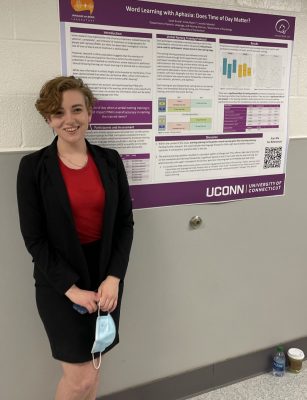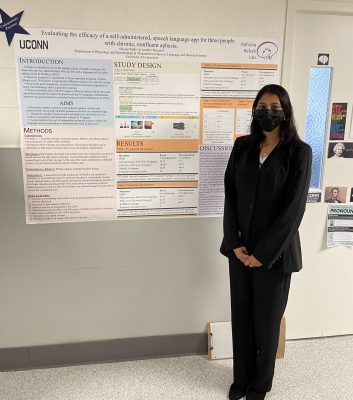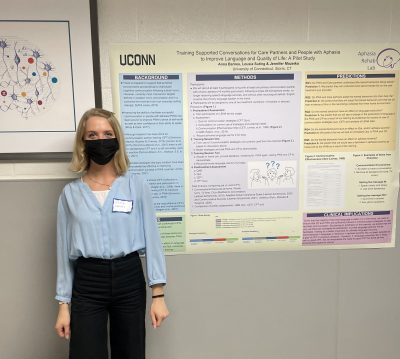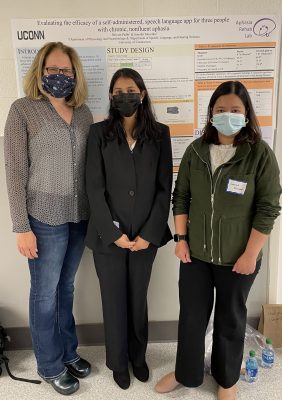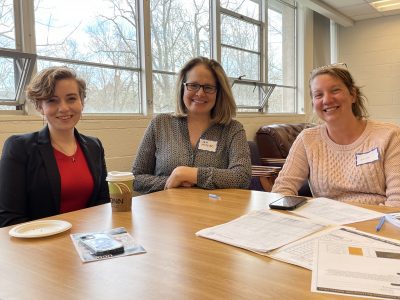Aphasia group members discuss the things that bring them happiness in life. Thanks Danielle and Katarina, first year grad students for the idea, the interviews and video creation!!
The 2022 ARL Newsletter has hit the presses
First year MA students, Kayla Stalph and Casey Lee have assembled and edited this year’s newsletter about and for people with aphasia. This one highlights two of our newest group members, Liz and James. Feel free to send to your friends: ARL Newsletter
UConn Aphasia Group Participants perform in My Pal Patsy!
Every year our first year students are asked to engage with the aphasia community in a way that is non academic. Janet Desmarais, 1st year SLP grad student, chose to direct and produce a play this year. We are so impressed with the production and also with the incredible performances by these four individuals. I loved it and know you will too! Take a look!
The ARL represents at LangFest 2022!
Congratulations to the students who presented today at LangFest 2022!
Sarah Arnett (2nd year MA student) and Shivani Padhi (senior undergraduate) are two longtime members of the Aphasia Rehab Lab who did us proud! Both of them presented at the Data Blitz and also during the poster session. Shivani is off to pursue a Masters of Public Health and Sarah will soon be employed as a Speech Language Pathologist! Anna Barnes is a first year MA student and is one of our newest lab members. She presented a poster proposing a her plan for her MA thesis. Welcome, Anna!
Congratulations Amanda Wadams for recent publication!
Amanda Wadams is the first author on a systematic review published in Frontiers in Rehabilitation. The title of the paper is Metacognitive Treatment in Acquired Brain Injury and Its Applicability to Aphasia: A Systematic Review. Congratulations Amanda!
Abstract:
Purpose: The purpose of this systematic review is to identify the utility of metacognitive therapeutic intervention for persons with acquired brain injury (ABI), with a focus on persons with aphasia.
Methods: A search of six databases resulted in two hundred and sixty-six unique manuscripts relating to the explicit use of metacognitive treatment for people with ABI. Two independent reviewers rated abstracts for inclusion or exclusion of the study given predetermined criteria. Twenty-nine articles, five of which included people with aphasia, were selected for inclusion in this systematic review. SCED+ and PEDro+ rating scales were used to rate the methodological quality of each study.
Results: Methodological quality of the 29 studies that met inclusion criteria ranged from weak to high quality studies. Three -hundred and sixty-nine individuals with ABI took part in the 29 studies. Varying treatment methods were employed. Outcome measures were inconsistent. Metacognitive treatment has been applied to people with aphasia with positive results, but efficacy of the treatment cannot yet be determined.
Conclusions: Metacognitive therapeutic intervention tends to be effective for persons with acquired brain injury (ABI) despite variability between intervention designs and treatment outcomes across studies. Due to so few studies with participants with aphasia, we were unable to draw conclusions regarding the efficacy of metacognitive treatment for people with aphasia. Further research on the efficacy of metacognitive treatment for this population is warranted.
Join us for a talk from Dr. Charles Ellis
All are invited to attend our first SLHS colloquium of the 2021-22 academic year. Our first speaker is Dr. Charles Ellis, PhD CCC-SLP. Dr. Ellis is an ASHA Fellow and Professor at the University of Florida. Though his population of interest is aphasia, the impact of social determinants of health are relevant to all of the populations that we as SLPs and Audiologists serve!
If you missed it, he was awesome! Check out the recording, below.
Telepractice approaches have emerged as a foundational approach for offering SLP/A after the onset of COVID-19. However, even when the client and provider are able to align from a technological standpoint, other difficult to measure factors can influence the success or failure of telepractice approaches in similar ways to face-to-face approaches. In this presentation, the presenter will provide an overview of the initiation of a telepractice aphasia research program and the discuss the impact of social determinants of health on the success of the approach and clinical outcomes achieved.
Congrats Louisa Suting on publishing in Perspectives In Speech and Language
Analysis of Real-World Language Use in a Person With Wernicke’s Aphasia
Louisa has published the first of several studies where we analyze the communication environment in the homes of people with aphasia and those without. In this first study, we looked at changes in the natural language occurring at home before and after a massed practice type treatment with an individual with Wernicke’s aphasia.
General Hayden on NPR discussing life with aphasia
NPR’s Mary Louise Kelly sat down with former CIA Director Gen. Michael Hayden and his wife, Jeanine, to talk about his life with aphasia, a condition which makes it difficult to communicate. Interview is here:
https://www.npr.org/2021/08/11/1026831053/i-want-to-do-more-gen-michael-hayden-on-living-with-speech-inhibiting-aphasia
Aphasia Rehab Lab presentations
Several students from the aphasia rehab lab have been accepted to present their work virtually this year. These have included the Academy of Aphasia, ASHA, and the upcoming Clinical Aphasiology Conference. We will also be presenting at this year’s UConn Language Fest 2021. Please take a look here:
Kaila Cote Named ANCDS Fellow
Congratulations to Kaila Cote, ARL alum, on being named 2020 ANCDS Fellow!
https://www.ancds.org/past-student-fellows?fbclid=IwAR0dEgYAFA8QebSD8JsZzwf1zE9B2EShtELFl80kZ8tCmh8IHpSIxCiyKFw
